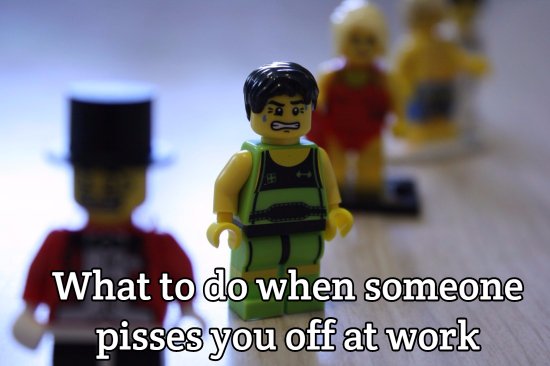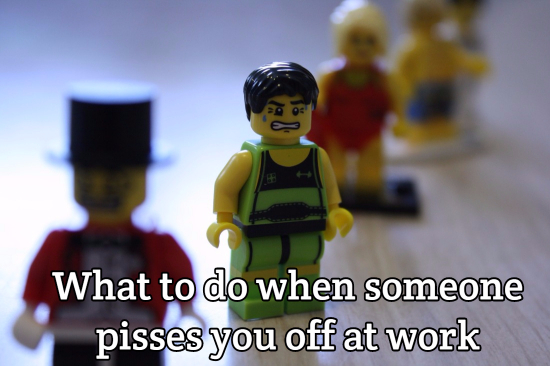Someone is bound to piss you off at some point in your career. Even the most rational and reasonable people get angry sometimes. I certainly do.
So, you get angry at your boss, a co-worker, or client. What do you do? How do you handle yourself professionally?
For years I didn’t get angry. Or, well, I suppose I did and I just held that anger back until it started to eat away at me. I was prone to depression. My health suffered. I tried to keep the peace by letting it go but what I thought was letting go was actually ignoring it. Obviously this is not a healthy way to address anger in the workplace!
I’ve worked with people who handle anger quite differently from me. They lash out in anger, raising their voice, making accusations, and blaming others. I can’t say what it’s like to be that person, but lashing out in anger doesn’t seem to benefit them and it certainly doesn’t benefit me to be on the receiving end. This response to conflict is no better than holding it back.
I recently got pissed off at someone I work with. In the moment, I shut down. Then I started to think about a better way to handle the situation and realized I already knew a better way! Here are 6 questions I asked myself to handle the situation professionally.
6 Questions to Address Conflict at Work
01. How important is it?
Anger feels pretty significant in the moment, but it’s important to ask yourself, “how important is it?”
Is your ability to do your job affected? Did the situation cause irreparable harm to you or your career? Will this incident matter in a week? How about a month? How about next year?
Putting the conflict in perspective makes it easier to address.
02. What’s your part?
While someone else’s behavior may have been out-of-line, chances are so was yours. What’s your part in the conflict?
Did you communicate expectations clearly? Did you ask for more information? Did you give the other person a chance to talk? Did you treat the other person with respect?
Taking responsibility for your part in conflict builds confidence, authenticity, and authority. When you own your part of the problem, you can own your part of the solution. And, it’s easier to be compassionate with others when you acknowledge you screwed up, too.
03. What do you need?
When someone pisses you off, it’s important to take a time-out to attend to your needs.
Do you need a break? Do you need a glass of water, or to go for a walk?
Take care of yourself and you’ll be ready to approach the situation with a clear head.
04. What happened?
Instead of assuming you have all the facts, stay open and curious about what happened. Ask for more information.
What happened? Why? What is the other person’s perspective on the conflict?
Staying curious will help you understand the other person as well as the problem. Finding out what really happened leads to better relationships and better solutions.
05. What’s your motivation?
When you consider addressing the conflict, consider your motivation.
Do you want the other person to feel embarrassed or ashamed? Do you want to be heard? Do you want an apology? Do you want a mutually beneficial resolution?
Understand your motive before you try to address the conflict.
06. Can we talk about what happened?
When you’re ready to address the conflict, ask for permission to discuss it.
Is this a good time? Can we talk about what happened?
Getting permission puts you both on equal footing and starts the conversation with respect and courtesy.
The next time someone pisses you off at work, use these 6 questions to resolve conflict with self-assurance, confidence, and increase your chances for a positive resolution.
Looking for more tips on improving your work relationships? Join my bi-weekly newsletter!
[mc4wp_form]

